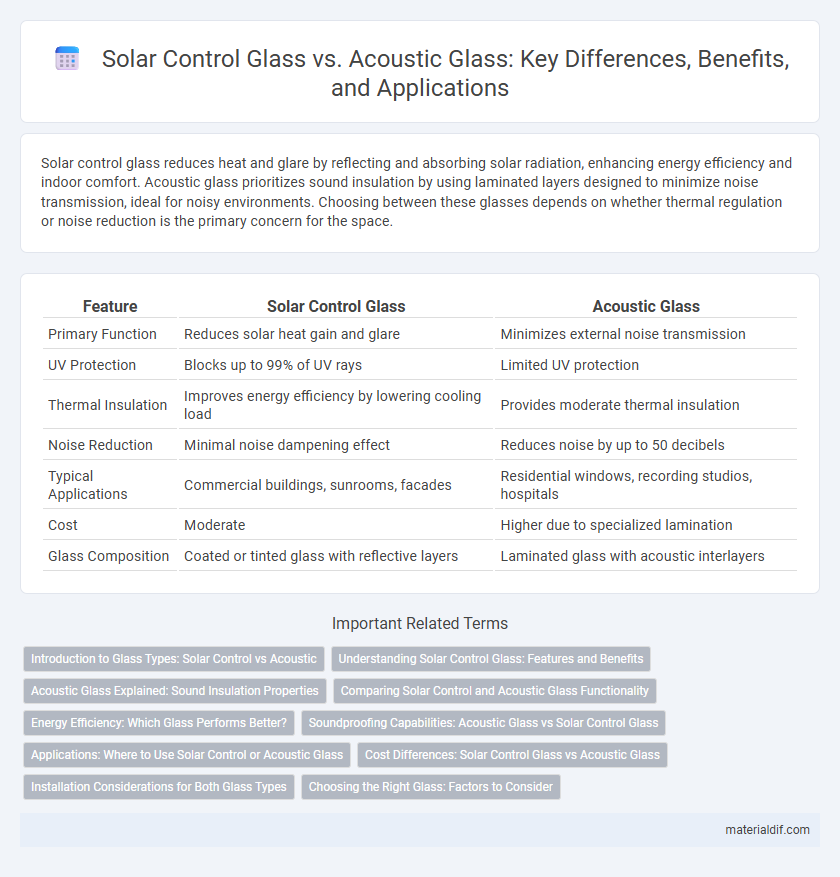Solar control glass reduces heat and glare by reflecting and absorbing solar radiation, enhancing energy efficiency and indoor comfort. Acoustic glass prioritizes sound insulation by using laminated layers designed to minimize noise transmission, ideal for noisy environments. Choosing between these glasses depends on whether thermal regulation or noise reduction is the primary concern for the space.
Table of Comparison
| Feature | Solar Control Glass | Acoustic Glass |
|---|---|---|
| Primary Function | Reduces solar heat gain and glare | Minimizes external noise transmission |
| UV Protection | Blocks up to 99% of UV rays | Limited UV protection |
| Thermal Insulation | Improves energy efficiency by lowering cooling load | Provides moderate thermal insulation |
| Noise Reduction | Minimal noise dampening effect | Reduces noise by up to 50 decibels |
| Typical Applications | Commercial buildings, sunrooms, facades | Residential windows, recording studios, hospitals |
| Cost | Moderate | Higher due to specialized lamination |
| Glass Composition | Coated or tinted glass with reflective layers | Laminated glass with acoustic interlayers |
Introduction to Glass Types: Solar Control vs Acoustic
Solar control glass features specialized coatings that significantly reduce heat transmission and block ultraviolet rays, enhancing energy efficiency and comfort in buildings. Acoustic glass is engineered with laminated layers and interlayers designed to dampen sound vibrations, providing superior noise reduction for quieter indoor environments. Both glass types serve distinct functional purposes, with solar control targeting thermal regulation and acoustic glass focusing on sound insulation, making them essential choices for modern architectural applications.
Understanding Solar Control Glass: Features and Benefits
Solar control glass features advanced coatings that reduce heat gain by reflecting and absorbing solar radiation, enhancing indoor comfort and energy efficiency. This type of glass significantly lowers air conditioning costs by minimizing solar heat penetration while maintaining natural light transmission. In contrast to acoustic glass, which prioritizes sound insulation, solar control glass primarily targets thermal regulation and UV protection, making it ideal for energy-conscious building designs.
Acoustic Glass Explained: Sound Insulation Properties
Acoustic glass is specifically designed to reduce noise transmission through windows and facades by incorporating multiple layers with laminated interlayers that dampen sound vibrations. Its sound insulation properties are measured by the Sound Transmission Class (STC) rating, with higher values indicating better noise reduction, making it ideal for urban environments and locations near highways or airports. Unlike solar control glass, which primarily filters solar radiation to reduce heat and glare, acoustic glass focuses on creating a quieter indoor environment by minimizing external noise pollution.
Comparing Solar Control and Acoustic Glass Functionality
Solar control glass primarily reduces heat gain and UV radiation, enhancing energy efficiency and indoor comfort by reflecting or absorbing solar energy. Acoustic glass is designed to minimize noise transmission, using laminated layers that dampen sound vibrations and improve sound insulation in buildings. The choice between solar control and acoustic glass depends on whether thermal management or noise reduction is the primary concern for the space.
Energy Efficiency: Which Glass Performs Better?
Solar control glass enhances energy efficiency by reflecting and absorbing solar radiation, significantly reducing cooling loads and minimizing heat gain in buildings. Acoustic glass primarily focuses on sound insulation, with minimal impact on thermal performance or energy savings. For optimal energy efficiency, solar control glass outperforms acoustic glass by lowering reliance on air conditioning systems and contributing to reduced energy consumption.
Soundproofing Capabilities: Acoustic Glass vs Solar Control Glass
Acoustic glass is specifically engineered with laminated layers and interlayers to significantly reduce noise transmission, offering superior soundproofing capabilities compared to solar control glass. While solar control glass primarily focuses on reflecting and absorbing solar radiation to reduce heat gain, it provides minimal noise insulation. For environments where minimizing external noise is critical, acoustic glass is the optimal choice due to its enhanced soundproofing properties.
Applications: Where to Use Solar Control or Acoustic Glass
Solar control glass is ideal for commercial buildings, residential homes, and skylights where reducing heat gain and enhancing energy efficiency are priorities. Acoustic glass is best suited for environments requiring noise reduction, such as urban residences, office spaces near high-traffic areas, and recording studios. Selecting solar control glass improves thermal comfort and lowers cooling costs, while acoustic glass enhances sound insulation for a quieter indoor atmosphere.
Cost Differences: Solar Control Glass vs Acoustic Glass
Solar control glass typically costs between 15% and 30% less than acoustic glass due to simpler manufacturing processes and materials focused on reflecting infrared rays and reducing heat transmission. Acoustic glass incorporates specialized laminates and thicker layers designed for superior sound insulation, which significantly raises production expenses and, consequently, market prices. When budgeting for energy efficiency and noise reduction, the higher price of acoustic glass reflects its advanced soundproofing benefits, whereas solar control glass offers more affordable thermal control solutions.
Installation Considerations for Both Glass Types
Solar control glass requires precise alignment for optimal solar heat reduction and often involves coatings that must remain intact during installation, necessitating experienced handling. Acoustic glass installation demands careful sealing and lamination techniques to maximize sound insulation performance and prevent vibration transmission through frames. Both glass types benefit from professional fitting to ensure durability, energy efficiency, and noise control.
Choosing the Right Glass: Factors to Consider
Solar control glass reduces heat gain and UV radiation, making it ideal for energy efficiency and climate control, while acoustic glass minimizes noise pollution with multilayered lamination and sound-dampening materials. When choosing the right glass, consider factors like climate, building orientation, noise levels, and energy consumption goals to balance thermal performance and sound insulation effectively. Optimal selection enhances comfort, lowers energy costs, and improves indoor environmental quality.
Solar control glass vs Acoustic glass Infographic

 materialdif.com
materialdif.com